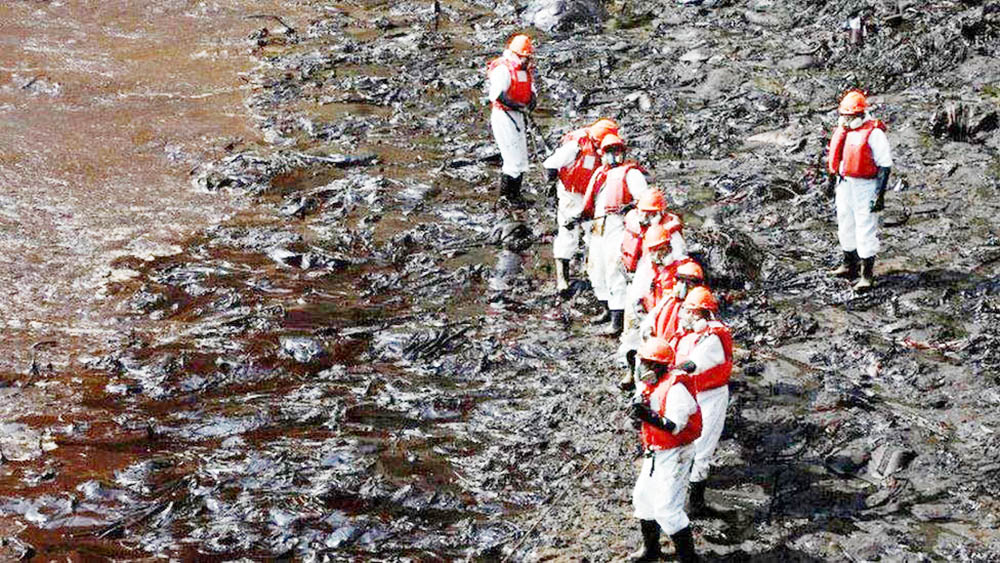Nowhere in the hemisphere have the risks associated with the oil industry been more graphically illustrated recently than in Peru when, back in January, a tanker spilled oil at a refinery owned by the Spanish oil company Repsol, the mishap reportedly directly affecting more than 700,000 Peruvians and causing the authorities there to have to effect an elaborate and costly cleanup.
On account of the oil spill and its consequences, Repsol and other lesser players in Peru’s oil industry are now confronted with a Peruvian lawsuit in which a total of US$4.5 billion is being sought for the physical and environmental damage caused by the oil spill.
This lawsuit is the first of what may well be a number of civilian claims for liabilities resulting from the mishap, a circumstance that illustrates that while the returns accruing to the heavy-hitting oil companies in the sector can be huge, both the risks associated with oil recovery and the costs that are sometimes attached to oil spills can be astronomically high.
A May 16 report says this is just the first civilian claim for liabilities that seeks compensation for the affected “consumers, users, and third parties.” That, however, is not the full extent of the price that Repsol may eventually be required to pay for the Peru debacle. The company is reportedly preparing itself to face separate criminal charges that directly target the managers of Repsol’s La Pampilla refinery complex where the spill occurred.
Unsurprisingly, in the face of such an astronomical lawsuit, Repsol has asserted that the suit is baseless, pointing to what it says has been its ongoing cleanup efforts since a tanker spilled oil at the company’s refinery as part of a wider costly ongoing overall cleanup response.
The lawsuit, according to the Peruvian authorities, is based on damage suffered by more than 700,000 residents of the region in which the oil spill occurred as well as the wider environmental impact on some of Peru’s coastal areas, beaches and fishing activities, circumstances that have had a wider impact on the country’s tourism industry and other commercial activities.
Peru is reportedly seeking from Repsol, an amount of US$3 billion for what is being described as “direct damages” on behalf of “consumers, users, and third parties” impacted by the spill.
Other companies involved in Peru’s oil industry including the insurance company, Mapfre, the La Pampilla refinery, and the operators of the tanker involved in the incident have also been named in the lawsuit.
The case stems from the January 15 incident when the oil tanker ‘Mare Doricum’ released approximately 6,000 barrels of crude oil during an offshore unloading operation, a circumstance which Repsol said was the result of unusually high waves that struck the tanker. Reports on the incident paid particular attention to damage done to twenty-eight beaches across seventy-five nautical miles of coastline.
In the face of the enormous lawsuit Repsol has described the legal action as “unfounded, inadmissible and incongruous because it does not address the causes of the spill.” A report on the exchanges between the Peruvian government and Repsol alludes to Repsol’s assertion that it has “used all the means at its disposal to contain, clean, and remedy the coastline and help the communities in the area. More than 2,900 workers have been assigned to the cleanup along with the deployment of up to 11,000 meters of containment barriers, using 144 units of heavy machinery, nearly 90 boats, and 68 skimmers. In addition, the company cites efforts that have identified to compensate over 5,500 individuals impacted by the spill who have received initial compensation of nearly $7.7 million.”
Immediate and costly post-spill cleanups, however, rarely if ever properly address the longer term environmental impact of oil spills which have been known to result in threats to food sources and physical and mental health arising both directly and indirectly from oil spills.
Operating rules governing the global oil & gas industry pay particular attention to oil spill prevention procedures, control and counter-measures and Facility Response Plans (FRP’s) Rules. These are intended to help oil recovery operations to avert the discharge of oil into navigable waters or adjoining shorelines.
The FRP rule requires operating facilities to prepare and submit response plans and contingencies for responses to “worst case oil discharges or threat of a discharge.”
The content of this article is supported by a May 16, 2022 publication by the Marine Executive.
